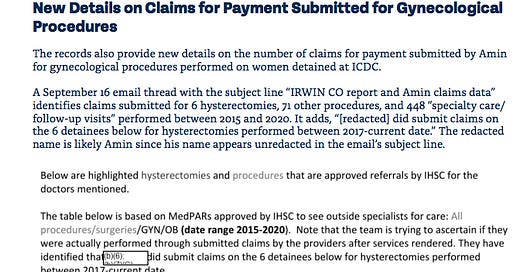January Round-Up
Unpacking #DetentionKills Transparency Initiative Work in the First Month of 2024
January was a busy month on our FOIA docket. Lots of incredible revelations and frustrating obfuscations. Here’s a quick rundown of some highlights and lowlights from our continuing quest for information about the deadly detention system.
Beetlejuice!?.
We learned today (1/31) that the Department of Homeland Security’s FOIA Office (DHS-PRIV) believes it keeps virtually no internal records that should show how it complies with FOIA’s Beetlejuice Provision.
5 USC 552a2Dii requires federal agencies to proactively disclose records when they’ve been requested three times or more. Here’s a handy chart we put together about the stuff you shouldn’t have to FOIA. Failing to make those disclosures undermines transparency in several ways. First, it puts a burden on the public that the law says the agency should bear. We don’t know without getting access to current FOIA logs what records are subject to three or more requests. The agency does. So the agency should comply with its duty to affirmatively release those records. Second, Beetlejuice violations clog the FOIA queue with requests that shouldn’t be necessary in the first place. This adds work for FOIA processors that slows down the response times all requestors face and makes litigation more likely. Third, failing to publicly disclose Beetlejuice records increases the costs of FOIA compliance for the agency and the public alike. In the face of long backlogs for frequently requested records, requestors have to make a request, wait, and then sue. The agencies, in turn, have to process the request, and if they can’t do so in a timely manner, potentially spend money that should be expended on processing defending a lawsuit that shouldn’t be necessary in the first place.
Death records are classic Beetlejuice! matter. We’ve seen over and over again once we’ve had to file suit to get them that the agency released some of what we waited months to obtain in a separate litigation years before.
This situation is nonsensical.
So we filed a FOIA all the way back in May 2022 to see if we could figure out where the breakdown is and educate the agency, courts, and policymakers about how to fix it. First the agency told us the following request is too broad:
This is a Freedom of Information Act (FOIA) request aimed at understanding your agency’s compliance with the E-FOIA Amendments of 2006, and how the information contained, and omitted from, your agency’s FOIA Reading Room may come short of compliance with your obligations under the law.
Ensuring agencies proactively disclose frequently requested records helps everyone. The agency’s FOIA backlog — a longstanding, widely acknowledge[d] concern for Congress — will be reduced by affirmative identification of frequently requested records. The agency will get fewer requests by making more of the frequently requested materials more easily accessible. Agency FOIA reviewers will not have to reinvent the wheel in processing redactions and determin[ing] which exemptions apply. And the public will get more complete and timely access to information because the agency will have posted it.
This is not an aspirational goal; it is the law.
5 U.S.C. 552(a)(2)(D)(ii)(II) requires agencies to post records that have been requested 3 or more times. The “Beetlejuice Provision”, if you will.
Our review of your agency’s public FOIA reading room, and a comparison of the publicly available FOIA logs your agency publishes, reveals that a number of thrice-requested materials appear to be missing. Consequently, we file this request to understand the process by which your agency determines what to include under the Beetlejuice Provision.
1. Please provide all calendar entries, meeting minutes, attendee lists, working papers (or similar documents), slide decks or presentations, and follow-up calendar items for any meeting your agency’s FOIA Officer or designee held to consider the agency’s affirmative releases and proactive disclosures under the Beetlejuice Provision.
2. Please provide any record reflecting your agency’s FOIA Officers’ identification of a record that may be eligible for release based upon the Beetlejuice Provision because it has been requested three times under paragraph 3. If the records requested are kept in an electronic system of records, like eFOIAExpress, we would accept a printout of requests designated as potential subject to proactive release under the Beetlejuice Provision in lieu of records responsive to this Item.
3. Any guidance your agency issued for FOIA professionals regarding identification of requests that are potentially subject to proactive release under the Beetlejuice Provision.
Please task a search period beginning on January 1, 2022, and ending May 18, 2022.
DHS-PRIV responded in July 2023 that it possessed no records responsive to this requests.
No calendar entries. No meeting minutes. No attendee lists. No working papers. No slide decks. No presentations. Nothing about the agency’s efforts to identify proactive Beetlejuice disclosures.
We appealed because this response is nonsense.
On January 12, 2024, won the appeal. The Judge remanded the request back to DHS-PRIV to search again.
But DHS-PRIV didn’t search again. Instead, on January 31, the agency simply sent us the same answer they sent before we appealed.
Live look at our next administrative appeal, which is our third of the request:
Beetlejuice! Beetlejuice? Beetlejuice.
Deloitte, SecureRelease, and 6 C.F.R. 5.3
Maybe you’re familiar with the revolutionary technology private contractors sold the government to make FOIA work better. It’s called SecureRelease. And it’s managed by Deloitte. FOIA officers have been doing their best to steer requestors into this system in order to better manage the FOIA queue and chip away at the backlog. (There is no current, official date on which the agency will actually clear its backlog under the previous DHS Backlog Reduction Plan (a ‘Business Modernization Roadmap’ 2020-2023) But if there were, SecureRelease and Deloitte would form an essential part of achieving it.
Lacking the public contract information for what Deloitte agreed to provide DHS for the tens of millions of dollars it’s been paid to modernize the agency’s FOIA business, we filed a FOIA back in December 2022. We sought:
Contracting documents evidencing DHS-ICE’s transfer of technological responsibility to private contractor Deloitte for handling Freedom of Information Act Requests, including any Quality Assurance Surveillance Plan, Statement of Work, Performance Work Statement, or other similar document outlining the responsibilities Deloitte has accepted with respect to processing FOIA requests.
Please search DHS’s FOIA Office, the Office of the Secretary, the Office of the Chief Financial Officer, and the Office of Acquisition Management for records responsive to this request.
Please note that we previously requested these records ICE. ICE assigned our request 2023-ICFO-07520 and denied it by informing us that DHS is the proper custodian of these records.
We did that because ICE told us it didn’t have any information in its possession about the agency’s shift to SecureRelease. We’d have to get that from DHS-PRIV, ICE said.
DHS-PRIV originally described our request above as “too broad.” This determination came as part of a well-documented pattern and practice of illegality at the administrative stage through DHS FOIA components, but particularly in ICE and DHS-PRIV. We appealed a year ago. In April 2023, we won.
Last week we got the 55-page Statement of Work DHS-PRIV apparently generated in association with the contract Deloitte received—and nothing else.
We’re still unpacking what’s in the SoW, but one point stands out: DHS-PRIV switched the platform for making FOIA requests without updating Section 5.3 of its FOIA regulations and the accompanying appendix. That’s where the agency, pursuant to Congressional mandate, tells the public how to make the requests. On that basis alone, the Deloitte-DHS-PRIV contract is arguably a violation of the agency’s authority, and in violation of the law.
That legal violation is compounded by the SoW provision that asks Deloitte (or another successful proposal) to provide “the ability to require users to create an account prior to submitting a FOIA request.” Not what the law says. Not what the regs say. Not what is required of the public. But it’s in the contract.
One thing that may be helpful to the requestor community and oversight bodies are the confirmations in the SoW that Deloitte can generate statistical reports about what’s in a particular document set. More broadly, the SoW requires Deloitte to make available to DHS a broad array of reports that will be useful to the requestor community, if only we ask.
FOIA litigants who, like us, receive monthly productions in court from DHS FOIA agencies saying they just discovered hundreds of pages of duplicates, and that waters down the number of responsive pages we can receive, might consider pointing out to US Attorneys, agency counsel, and courts that the agency’s own software has de-dupeing/unduping functionality that could assess the presence of duplicates at the beginning of a case, and provide a report on which pages are allegedly duplicates.
We note that a Quality Assurance Surveillance Plan appears referenced in the SoW, that we asked for this document, and that DHS-PRIV elected not to provide it. Appeal pending.
Expedited Processing for DHS-OIG Medical Abuse Working Papers
As much as we find out, it often feels as though we learn nothing. In the wake of the allegations of widespread medical and gynecological abuse at the Irwin County Detention Center in 2020, the media lost the forest for the trees. Everyone fixated on the idea that the gynecologist had only performed two hysterectomies. That drowned out the credible allegations of women that he performed other potentially sterilizing procedures like salpingectomies, oofectomies, and LEEPs, and that the invasive procedures were medically unindicated and nonconsensual. All many in the beltway remembered, thanks to some clever media framing, was that there were no mass hysterectomies because he’d only done 2.
When Project South and Citizens for Responsibility and Ethics in Washington (CREW) filed a FOIA request and later sued, here’s what turned up:
In late 2022, the bipartisan findings of the Senate Permanent Subcommittee on Investigations corroborated the women’s claims of widespread, nonconsenual, invasive, and potentially sterilizing gynecological procedures. No federal official bothered to offer an apology, much less an explanation for why DHS IG Joseph Cuffari, who testified under oath during the hearing, previously concluded medical care at the facility “generally met standards.”
Dr. Stewart Smith, appearing for the ICE Health Services Corps, could not explain how a single provider was about to perform up to 94% of some surgeries on just 6% of ICE’s detained female population. Dr. Smith stood by his previous assessment, with Dr. Cuffari, that this pattern of treatments presented no “red flags” for IHSC.
Cuffari kept his job. LaSalle Corrections kept its other ICE contracts. Dr. Smith remained at IHSC after the hearing. No legislation followed it that would codify any recommendations from the Senate PSI. Everyone sort of moved on.
Fast forward to this month. Two MORE hysterectomies at OTHER ICE facilities!?! The shock tweets circulated and the echoes of 2020 rang out.







